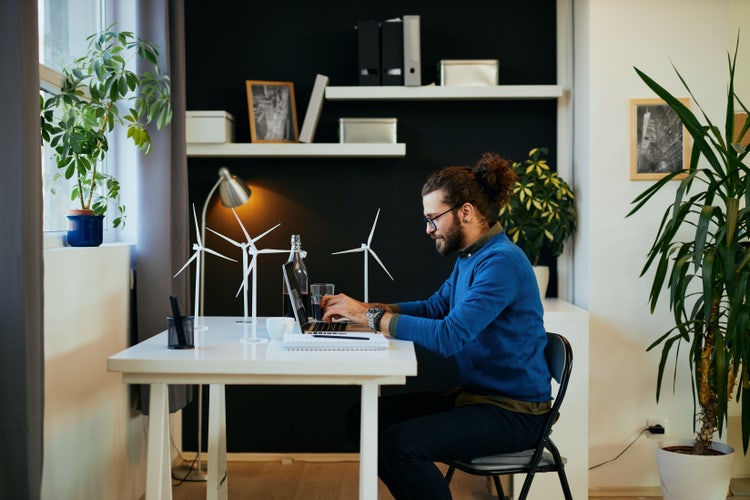U.S. enterprise worker survey shows sustainability at work trends and forecast

Sustainability is increasingly important to businesses, but what about their employees? In our Sustainability @ Work study, Adobe recently surveyed 1,400 enterprise workers in the U.S. to understand employees’ stance on environmental impact. We asked respondents about personal and professional sustainability initiatives and their forecasts for the next 5-10 years. Here’s what they said.
In this article
- What’s missing from the sustainability-at-work conversation
- How the hybrid workplace impacts sustainability initiatives
- Sustainability ambassadors drive workplace changes
- The future of sustainability at work
What’s missing from the sustainability-at-work conversation
Employees feel there are many benefits to instituting sustainability practices at work. About a third of employees think it would boost productivity rates (35 percent), position their company as a leader (31 percent), and open more opportunities for innovation (37 percent). Forty-three percent think it would improve workplace culture.
But what do employees believe to be the largest contributor to their employer's environmental impact? Most say paper consumption (57 percent), but according to the United States Environmental Protection Agency (EPA), the primary sources of greenhouse gas emissions in the U.S. are transportation (29 percent) and electricity (25 percent). The agriculture sector, including deforestation, represents 10 percent. There’s a misconception from employees about environmental impact contributors, revealing an opportunity for education.
How the hybrid workplace impacts sustainability initiatives
Employee perceptions of environmental impact depends on the office setting. Compared to employees that work in a physical office, hybrid and remote employees feel more strongly that office commutes (40 percent and 52 percent vs 27 percent), physical office footprints (40 percent and 45 percent vs 27 percent), and business travel (26 percent and 31 percent vs 16 percent) contribute to their employers’ environmental impact. But in-office employees, which are closer to company-wide trash cans, are more concerned about food waste (33 percent) than hybrid (23 percent) and remote (16 percent) employees.
When it comes to taking action, hybrid employees are more likely to say they’re partially responsible (58 percent) for their employer's sustainability practices compared to remote (45 percent) and in-office (43 percent) employees. As such, around two-thirds of hybrid and remote employees are willing to make their home office more sustainable with homemade meals instead of ordering out (67 percent, 79 percent), unplugging or shutting down devices when not in use (70 percent, 72 percent), using energy efficient appliances (63 percent, 66 percent), and being more mindful of heating/air conditioning use (60 percent, 64 percent).
Sustainability ambassadors drive workplace changes
Change starts with people and according to our research, millennials are the workplace sustainability ambassadors. They’re (65 percent) the most likely generation to encourage others to be mindful of sustainability practices, especially compared to boomers (54 percent), and feel strongest about only working for employers that prioritize sustainability (42 percent vs 21 percent).
Millennials are also prepared to make changes in their personal lives. Compared to all employees, more are planning to change their home energy source (58 percent vs 52 percent), eat more plant-based food (53 percent vs 45 percent), and rely on public transportation more than their car (34 percent vs 27 percent).
Certain industries are also paving the way for a greener future, and they are technology and financial services. These workers feel more strongly about their companies’ sustainability initiatives than the general population. Tech employees (82 percent) are more likely to say reducing business-related travel is important compared to employees overall (71 percent) and are more likely than FSI workers to say curbing electricity consumption is important (87 percent vs 79 percent).
The future of sustainability at work
Companies must be diligent in order to minimize their environmental footprint. Employees say rising supply costs (64 percent), supply chain shortages (48 percent), and geopolitical issues (29 percent) will be major challenges for corporate sustainability initiatives in the next five years. However, 42 percent of employees think their company will spend between $100,000-$1,000,000 on sustainable alternatives in that time. One in five ballpark more than a million.
Fast forward 10 years, most employees expect sustainability to be fully embedded in their work culture. They believe their companies will revamp their internal processes (71 percent) and have a dedicated sustainability department (64 percent).
Long story short, employees feel strongly about achieving sustainable workplaces and lifestyles. More than half (62 percent) say they’ll spend up to $10,000 on sustainable alternatives in the next five years and one if five predict to spend between $1,000-$5,000 (19 percent). In the next 10 years, they’re willing to reduce their plastic use (78 percent), purchase more sustainable products (75 percent), and change their travel habits (53 percent) and home energy source (52 percent). They’re not quite sold on reducing car travel though — only 27 percent plan to rely more on public transportation.
Reducing the environmental impact of workplaces — in office, hybrid, or remote — is a work in progress, but employees have a passion for getting involved. The future of work is already changing and we’re looking forward to seeing the role that sustainability plays in the next few years.
Learn more about Adobe’s commitment to sustainability here.